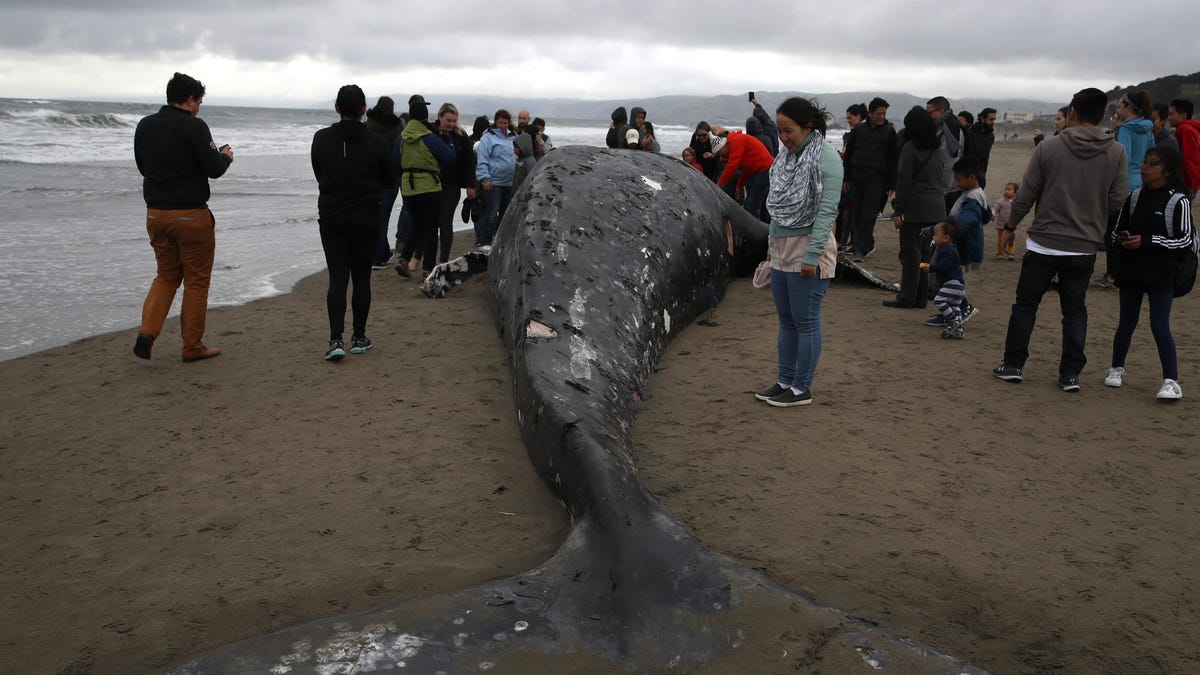Solar storms can mess with whales' ability to navigate, cause strandings
Researchers suggest increased solar activity may be messing with a special magnetic sense in the gray whale.

A gray whale stranded on Ocean Beach in San Francisco in 2019.
When I moved to Sydney, Australia, a few years ago I couldn't find my way around this sprawling mess of a city without my phone's GPS. The streets here are ridiculous and labyrinthine. There's no method to the madness, and so my GPS was indispensable. That's why I'm kind of jealous of whales.
The ocean's most mammoth, docile beasts don't have access to Google, and yet they still manage to find their way around the oceans with relative ease. And that's especially true for the gray whale, a creature that makes the biggest migration of any mammal, traveling over 12,000 kilometers (7,500 miles) across the planet to feed and breed. New research suggests gray whales may navigate with a kind of seventh sense that allows them to detect variations in the Earth's magnetic field -- and this sense can be adversely affected by the sun.
Gray whales are about as long as a school bus and six times heavier than an African elephant. They communicate using low-frequency sounds and navigate the oceans without the help of GPS.
In a study published in the journal Current Biology on Monday, researchers examined 186 strandings of gray whales reported between 1985 and 2018. To try to tighten up the data set and remove some variables, the team looked at strandings of whales that were stranded alive with "no signs of injury, illness, emaciation or human interaction." The strandings were then correlated with various measures of solar activity: how many sunspots were present, changes in the Earth's magnetic field and solar radio flux, which is determined by radio frequency noise and has shown to correlate well with sunspot numbers and be affected by solar storms.
The team found that gray whales were twice as likely to be stranded on days where there were 150 or more sunspots, compared to days when there were fewer than 12 and four times as likely to strand based on increased radio flux.
Such a result suggests the sensing mechanisms are somehow messing with the whales' navigation system. But how? Are the whales, like me stumbling around Sydney with my GPS signal down, not receiving magnetic field information? Or is solar activity affecting the magnetic field itself and sending them on an incorrect route?
Based on measurements of the Earth's magnetic field, it doesn't appear deviations increase the likelihood of a stranding. Thus, it seems the whales are losing their magnetic GPS signal.
"We show that the mechanism behind the relationship between solar storms and gray whales, if it is an effect on a magnetic sensor, is likely caused by disruption to the sense itself, not inaccurate information," said Jesse Granger, a PhD biologist at Duke University and first author on the study, in a press release.
This isn't the first time solar activity has been linked to whale strandings. Klaus Vanselow, a biologist at the University of Kiel, Germany, found that sperm whales, one of the ocean's great divers, have also had their strandings linked to increased solar activity. Vanselow told CNET he believes the magnetic sensing must be the same between sperm and gray whales. Later research by NASA disputed that it could just be solar storms driving whales to beach.
Vanselow explained that RF doesn't penetrate the water enough to adversely affect diving whales. So radio frequency noise can only be used as a proxy measure for solar activity affecting the magnetic field unless it's messing with the whales when they rise up from the depths for oxygen. "A direct influence can only happen at the surface," he said.
Granger says Gray whales "stay fairly close to the surface" during their migration, so RF noise is more likely to reach them than sperm whales.
Last week, researchers linked eight beaked whale stranding events with the use of antisubmarine sonar during major naval activities. Beaked whales communicate in a different way from gray whales, using their own form of sonar to navigate.
Though the study covered the years between 1985 and 2018, the National Oceanic and Atmospheric Administration in the US has identified an "unusual mortality event" for gray whales that began on Jan. 1, 2019. Since that date, 236 gray whales have stranded on beaches across Canada, the US and Mexico. Intriguingly, both 2018 and 2019 were years of low sunspot activity, with a high amount of "spotless" days.
"The more recent gray whale mortality events have largely been animals who are emaciated or ill," says Granger, explaining that these strandings would not have been included in the research anyway. "From my understanding, the more recent mortality events have been largely attributed to changes in the gray whales food patterns."
Granger says further work will examine whether other species of whale are affected by sunspots in such a way, in addition to looking at strandings on continents outside of the US. More data should help unravel just how big of a role the sun, burning almost 150 million kilometers away, plays on whale navigation.
Originally published 8:15 a.m. PT
Update, 1:08 p.m. PT: Adds comment from Granger

